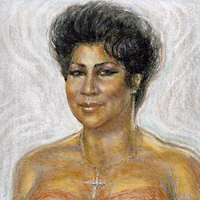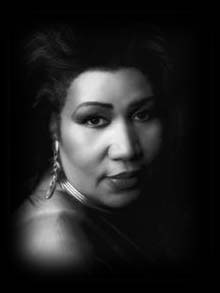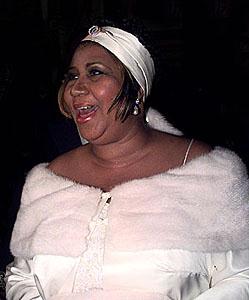 |

|
 |
| By Jesse Monteagudo
Aretha Franklin burst upon the music scene in 1967, just when I began my record collection. Back then Atlantic Records produced a series of long-playing records called "The Super Hits" and, of course, Aretha was the star of the series.
Franklin came to Atlantic Records after six less-than successful years with Columbia Records. Discovered by John Hammond, who called the Rev. C. L. Franklin's daughter "the greatest singer since Billie Holiday" (another Hammond find), Aretha recorded pop standards, show tunes and jazz numbers that made her popular with the supper club circuit but failed to make the Billboard charts. When Franklin's contract with Columbia ended Jerry Wexler, who minded Atlantic's soul train while founder Ahmet Ertegun worked the rock market, picked up the singer.
To a queer boy reaching puberty and realizing he was different, Aretha struck a chord with her songs of power and defiance. This was 1967, "rock's year of triumph," when the Monterey Pop Festival and Sgt. Pepper's Lonely Hearts Club Band joined Franklin in ending Broadway's forty-year control of the pop charts. But Franklin was more than a soul singer: Along with James Brown, she was the musical personification of the civil rights movement. Aretha also prefigured feminism with her no-nonsense approach to female-male relationships. Aretha's foremothers, Billie Holiday and Dinah Washington, had man problems and died young. Though Franklin had her own trouble man - namely her no-good husband, Ted White - she got rid of the lout just as her music was earning her universal R-E-S-P-E-C-T. Aretha stole "Respect" from Otis Redding, who wrote it as his take on marital problems, and turned it into a universal declaration of pride: for blacks, for women, for everyone - even for a 14-year old Cuban gayboy in Miami. Like other larger-than life black divas - Patti Labelle, Diana Ross, Tina Turner - Aretha Franklin enjoyed a vast gay following. Though Luther Vandross was not the only boy who was inspired by Queen 'Re, he was perhaps the most talented. (Luther would later return the favor, by writing and producing Aretha's 1982 hit, "Jump To It.")
In 1969 Wexler, Franklin's producer, "retired" to Miami, though he continued to work. Many of Aretha's early seventies' records were made at Hialeah's Criteria Studios, where she joined the Bee Gees, Eric Clapton and Miami native Betty Wright in this early version of the Miami Sound. Songs like "Call Me," "Don't Play that Song," "Spanish Harlem" and "Rock Steady" proved that Franklin had not lost her touch when she came to Miami. These were "old school" soul's sunset years, before it was captured and transformed by disco, reggae and funk. These were the years when I went to college, became a U.S. citizen, and came out. Here again, Aretha Franklin provided me with the soundtrack of my life. Aretha and I parted ways during the disco era. It was not a good time for the Queen of Soul, who made a series of horrible albums for a now-uncaring Atlantic. By 1979, Franklin was such a has-been that Steely Dan's "Hey, Nineteen" treated her as a historic artifact that no hip young person would recall.
For many years Aretha Franklin was a virtual recluse in Detroit, traumatized by her father's death and her own fear of flying. Only recently did she begin to tour. I saw Aretha Franklin live for the first time ever a few months ago, at the Sunrise Musical Theater near Fort Lauderdale. Aretha in concert was more than a show: It was royal audience, as a sold-out crowd of women, men and transgenders of all colors paid homage to the Queen. Franklin's natural musical instrument was at top form, as she belted both classic hits -- "Respect," "Chain of Fools," "A Natural Woman," "I Say a Little Prayer" -- and cuts from her new hit album, "A Rose Is Still a Rose." Those of us who were present remained standing through most of her performance and, when it was over, screamed for more. Aretha obliged, with a pull-out-all-stops gospel number that almost converted me. Though Franklin reached her peak in the sixties, she continues to be a force in American music. In 1987 she became the first woman to be inducted into the Rock and Roll Hall of Fame. She has won more Grammys than any other female singer. She was the youngest recipient of a Kennedy Center Honor. Time magazine named her one of the 100 most influential people of the Twentieth Century. And she continues to provide pleasure and inspiration to millions of fans, myself included. Franklin recently joined pop singers Mariah Carey, Celine Dion, Gloria Estefan and Shania Twain in a "Divas" concert on VH-1. Though Mariah, Celine, Gloria and Shania dominate the charts today, on stage they could not compete with the mighty 'Re, whom they willingly served as her back-up singers. Thirty years after "Respect," she remains the undisputed Queen of Soul. Photos: Arista Records (www.aristarec.com) |
© 1997-98 BEI
 From 1967 to 1969 she could do no
wrong, with songs like "Respect," "Chain of Fools," "Baby I Love You,"
"A Natural Woman," "Since You've Been Gone" and "Think" that set the
standard for female soul singing for the next three decades.
From 1967 to 1969 she could do no
wrong, with songs like "Respect," "Chain of Fools," "Baby I Love You,"
"A Natural Woman," "Since You've Been Gone" and "Think" that set the
standard for female soul singing for the next three decades.
 Wexler promised to take Aretha "back to church"; instead, he
took her to Muscle Shoals, where the famous FAME studios had made a name
for itself with hits by Wilson Pickett and Percy Sledge. Aretha sat
down at the piano and, accompanied by Muscle Shoals's better-than
average white band, recorded "I Never Loved a Man (The Way I Love You)."
And the rest is music history.
Wexler promised to take Aretha "back to church"; instead, he
took her to Muscle Shoals, where the famous FAME studios had made a name
for itself with hits by Wilson Pickett and Percy Sledge. Aretha sat
down at the piano and, accompanied by Muscle Shoals's better-than
average white band, recorded "I Never Loved a Man (The Way I Love You)."
And the rest is music history.
 Franklin was not a sex symbol like Ross or Turner; and female
impersonators did not win the Miss Florida title by looking like her.
This did not keep a 1970's South Florida drag act from becoming famous
as "Mr. Aretha"; surely a singular tribute from one queen to another.
Franklin was not a sex symbol like Ross or Turner; and female
impersonators did not win the Miss Florida title by looking like her.
This did not keep a 1970's South Florida drag act from becoming famous
as "Mr. Aretha"; surely a singular tribute from one queen to another.
 I only began to buy Aretha records again
after 1980, the year she signed a contract with Clive Davis's Arista
Records. With Arista, Franklin got back on track, producing hits like
"Jump To It," "Get It Right" and "Freeway of Love" and doing duets with
Elton John, George Michael and Luther Vandross, boys who, this much
less-musically talented author, grew up with the Queen.
I only began to buy Aretha records again
after 1980, the year she signed a contract with Clive Davis's Arista
Records. With Arista, Franklin got back on track, producing hits like
"Jump To It," "Get It Right" and "Freeway of Love" and doing duets with
Elton John, George Michael and Luther Vandross, boys who, this much
less-musically talented author, grew up with the Queen.